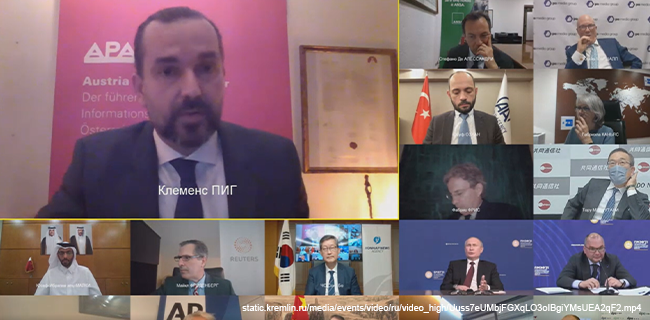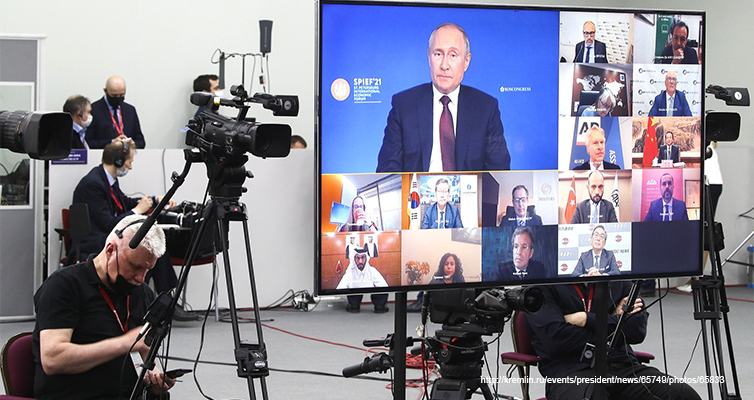Putin für gemeinsame Standards mit dem Westen
St. Petersburg/Wien (APA) – Der russische Präsident Wladimir Putin hat sich am Rande des Internationalen Wirtschaftsforums in St. Petersburg gegen „Doppelmoral“ ausgesprochen. „Wir müssen diese Doppelstandards loswerden!“, forderte der russische Präsident am 4. Juni in einer Videokonferenz mit den Chefs internationaler Nachrichtenagenturen, u.a. mit APA-Geschäftsführer Clemens Pig. Angesprochen auf die Verkehrssicherheit angesichts stornierter Flüge gab sich Putin uninformiert.
„Das höre ich zum ersten Mal“, sagte Putin auf die APA-Frage nach der Absage des geplanten Austrian Airlines Linienflugs aus Wien nach Moskau Ende Mai, weil die russischen Behörden der Maschine keine Genehmigung für eine Alternativroute zur Umgehung des weißrussischen Luftraums erteilt hatten. „Wir haben sehr gute Beziehungen zu Österreich, schätzen das und erachten das Land als verlässlicher Partner in Europa“, betonte Putin.

Erneut zog er einen Vergleich zwischen der von Belarus erzwungenen Landung mit dem regierungskritischen Blogger Roman Protassewitsch an Bord und der Causa des damaligen bolivianischen Präsidenten Evo Morales, dessen Flugzeug 2013 nach dem Entzug von Überfluggenehmigungen durch westeuropäische Staaten in Wien-Schwechat gelandet war. Putin betonte auf Nachfrage von Clemens Pig, dass „Verkehr, Mobilität und Meinungsfreiheit sehr wichtige Werte sind“. Russland „verstecke nichts“ und sei „zum offenen Gespräch bereit“.
Putin forderte „gemeinsame Standards“. Es dürfe nicht sein, dass in Europa Demonstrationen mit Tränengas und Gummigeschoßen, die zum Verlust eines Auges führen können, aufgelöst werden dürfen, in Belarus aber Verhaftung von Demonstranten nicht. Es sei nötig, allgemeingültige Kriterien für den Umgang mit Demonstrationen zu formulieren, erklärte Putin.
Der Präsident verteidigte außerdem das umstrittene Gesetz gegen „ausländische Agenten“. Russland verhindere damit die Einmischung in seine inneren Angelegenheiten. Aufgrund des Gesetzes mussten zuletzt mehrere Medien ihre Arbeit einstellen. Putin dagegen erklärte, dass die Medienvielfalt in seinem Land groß sei. Zudem warf er dem Westen vor, russische Journalisten insbesondere des russischen Staatssenders RT mit Schwierigkeiten zu konfrontieren. Es gebe Versuche, die Arbeit russischer Journalisten zu „ersticken“ durch technische und finanzielle Schranken. Putin forderte hier Gleichbehandlung.
Transkript des Gesprächs zwischen Wladimir Putin und Clemens Pig am 4. Juni 2021 (Auszug):
It is now Vienna’s turn, and I am happy to present our Austrian colleague, President and CEO of APA Dr Clemens Pig.
Mr Pig, as well as APA, is taking part in our meeting for the first time. Back in 2014, Mr Pig was appointed managing director of the APA Group, and in 2016 he became President and CEO. Mr Pig is working on an interesting subject: political communications amid the media’s digital transformation. He has won a lot of prizes and titles. In 2018, the Austrian Journalist magazine named him Media Manager of the Year, and this is the main trade magazine in Austria. In 2021, he was named Communicator of the Year by the Extra 1 magazine. This September APA marks its 75th anniversary, and of course, we congratulate them.
Please, Mr Pig, your question. It is very good that you have joined us.
President and CEO of the Austrian Press Agency (Austria) Clemens Pig (retranslated from Russian): Thank you very much.
Let me also thank you for congratulating us on the agency’s 75th anniversary. Mr President, thank you very much for inviting me to this meeting. Thank you for the opportunity to exchange opinions and ask questions.
How do you assess relations between Russia and Austria? On the one hand, it looks like Russia’s relations with some Eastern and Central European countries like Germany, Slovakia, the Czech Republic, and Poland have deteriorated after reports of hacker attacks and other similar problems. In addition, recently, on May 27, an Austrian Airlines flight from Vienna to Moscow was cancelled, and this became a serious problem because there is no other direct way to get to Moscow from Austria. Mr President, do you think you could use your influence on Belarus to ensure freedom of movement and freedom of information?
Thank you very much.
Vladimir Putin: We have very good relations with Austria. We value them very much and consider Austria to be a reliable partner in Europe; we implement major important projects together, including Nord Stream 2, as I mentioned earlier. Yes, indeed, life is complex and diverse, and there are issues with some European countries that require special attention and efforts at various levels for these relations to improve.
As for what happened to the Austrian Airlines flight, I honestly don’t know; this is the first time I’ve heard about it. I would guess that this is likely due to pandemic restrictions. I just don’t know anything about it. If so, if it is connected with the pandemic, it will pass, the situation will improve in our countries, and flights will be resumed.
As to freedom of movement, I feel that you are bringing me back to the issue of the plane landing in Minsk. I have already answered this question in general. To be honest, I didn’t want to talk about it, but you have forced me to do so. And I would like to strike the ball back to you: what do you think about President of Bolivia Evo Morales’ plane being forced to land in Vienna, escorting him off the plane and searching the presidential aircraft? So, the same thing happened in Vienna; in Vienna they grounded the head of state’s airplane. Sorry, I want to present myself as a hospitable host, but you are just pushing me into these questions. If you can ground the plane of the president of an independent country in Vienna, why can’t they land a plane in Minsk, especially if there was a signal that a bomb had been planted on board?
We just need to measure similar situations with the same yardstick, and not only in this case, but in general. We need to get rid of double standards; you can’t always say that one person can do this, and another cannot. A well-known proverb from the ancient world is well known to us: what is permissible for one person may not be permissible for another. May not be permissible for a bull. What’s that?
Let’s work out common approaches and come up with common assessments. Using tear gas, rubber bullets and water cannons to disperse demonstrations in Europe, and knocking out eyes with rubber bullets, is okay, but when there is an arrest in Belarus, maybe, done in a harsh manner, it is unacceptable. Why? Because European countries are democratic and they can do this in Europe. Let’s then come up with acceptable ways of handling street protests and define what exactly is unacceptable. Let’s develop common criteria and approaches, at least develop common definitions that will be understood by everyone the same way. Then it will be easier for us to give assessments to the events that are taking place in various regions around the world, including Europe.
I will not ask you anything about the President of Bolivia’s aircraft being forced down, but if you choose to comment on it, I think everyone would be interested to hear. Your colleague, who asked me a question like that in relation to my assessment of President Lukashenko’s actions, would be interested as well.
Sergei Mikhailov: Dr Pig, do you have a comment?
Clemens Pig: Thank you very much for your answer, Mr President. Frankly, in my question, I did not intend to touch on the issue of this plane landing nor push you to comment on it. I wanted to ask if your influence could be used.
Vladimir Putin: Used for what?
Clemens Pig: Just take advantage of your reputation to send a signal to everyone and to emphasise that freedom of movement, freedom of information are a great benefit that needs to be protected.
Vladimir Putin: Yes, of course, I fully agree with this. You know, we have a fairly open stance on almost all issues that are sensitive to us all. We are not hiding anything behind our back. We are open to an absolutely candid exchange of information, and we have nothing, strictly speaking, to hide. And we believe that this is the right approach. I have already covered the difficulties that our journalists encounter when working in some European countries or in the United States. They find it difficult to do their job, do you understand? Let’s approach this kind of work with the same yardstick. This also applies to freedom of movement, of course, I agree with you. But I assure you that you are overestimating my influence. I have expressed my position, and we will promote it. I will only be too happy if we work on this together.
Thank you very much.
Sergei Mikhailov: Thank you, Dr Pig.
Mr President, thank you.
Quelle: Meeting with heads of international news agencies • President of Russia (kremlin.ru)

